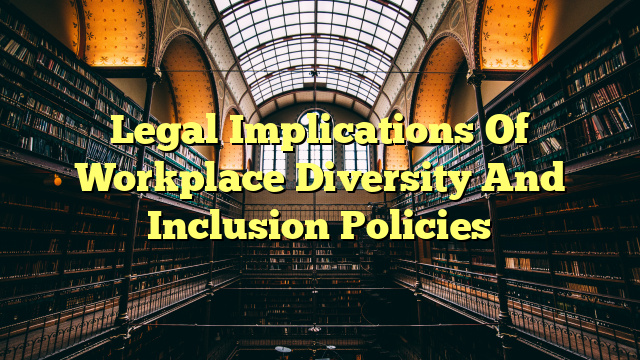Workplace diversity and inclusion policies have become increasingly important in recent years. As more companies strive to foster a culture of respect and acceptance, legal implications must be taken into consideration. This article will explore the legal requirements in relation to workplace diversity, potential legal and ethical ramifications, and the implications of embracing diversity and inclusion in the workplace.
What are the legal requirements in relation to workplace diversity?
Employers must be aware of relevant laws and regulations that require or encourage employers to consider diversity when making personnel decisions. For example, Title VII of the Civil Rights Act of 1964 prohibits discrimination in employment decisions based on race, color, religion, sex, and national origin. This applies to all aspects of the employment process, including recruitment, hiring, promotions, and termination.
In addition, the Equal Employment Opportunity Commission (EEOC) requires employers to maintain records of employee demographics and job classifications. The EEOC may then use the information to investigate potential discriminatory practices. Additionally, many states have laws that require employers to include diversity and inclusion in their hiring practices.
Are there legal and ethical ramifications of maintaining a diverse workforce?
Maintaining a diverse workforce can have both legal and ethical ramifications. From a legal perspective, employers must comply with relevant laws and regulations that prohibit discrimination in the workplace. If employers are found to have engaged in discriminatory practices, they may face significant legal consequences.
From an ethical perspective, organizations have a responsibility to create an environment that is free of discrimination and harassment. Organizations should strive to create an environment where all individuals are treated with respect and dignity. Additionally, employers should have policies in place that provide employees with avenues to report any instances of discrimination or harassment.
What are the legal obligations of diversity?
Legal obligations of diversity vary depending on the laws and regulations that apply to an organization. Generally, employers are required to ensure that their workplace is free of discrimination and that all employees are treated fairly. Additionally, employers should ensure that their workplace culture is one of inclusion, respect for diversity, and equality.
Organizations must also comply with relevant laws and regulations regarding diversity and inclusion. For example, many states have adopted anti-discrimination laws that require employers to consider diversity when making employment decisions. Furthermore, the EEOC requires employers to maintain records of employee demographics and job classifications.
What are the implications of embracing diversity and inclusion in the workplace?
There are numerous benefits associated with embracing diversity and inclusion in the workplace. Organizations that embrace diversity and inclusion are better able to attract and retain talent, as well as satisfaction of their employees. Additionally, organizations that foster a culture of inclusion and respect find that their employees are more likely to be loyal to the organization.
Organizations that embrace diversity and inclusion also tend to have greater success with innovation and problem-solving. By bringing together people with a variety of backgrounds, perspectives, and experiences, organizations are able to create a more dynamic workplace. Additionally, organizations that embrace diversity and inclusion often find that they are better able to understand their customers, as well as the changing needs of the marketplace.
Finally, organizations that embrace diversity and inclusion often find that they are better able to comply with laws and regulations related to workplace diversity. By having clearly defined policies and procedures, organizations are better able to demonstrate their commitment to a diverse and inclusive workplace.
Conclusion
In conclusion, workplace diversity and inclusion policies have become increasingly important in recent years. Employers must be aware of relevant laws and regulations that require or encourage employers to consider diversity when making personnel decisions. Additionally, organizations must strive to create an environment that is free of discrimination and harassment. Organizations that embrace diversity and inclusion often find that they are better able to attract and retain talent, as well as comply with laws and regulations related to workplace diversity.


Diversity and inclusion are essential in the workplace. Developing policies can ensure legal compliance and create an equitable atmosphere. Also, focus on anti-discrimination training.